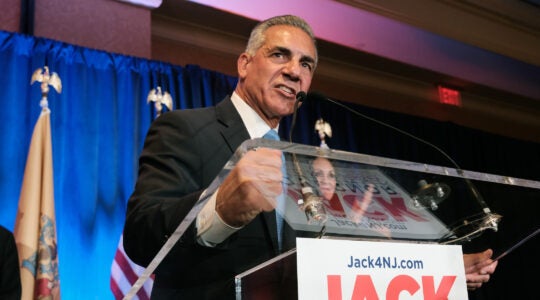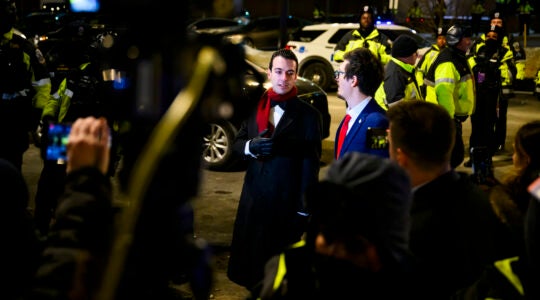The relationship between Hadassah, the Women’s Zionist Organization of America and the staff at the Hadassah Medical Organization, the hospital in Jerusalem it founded and owns, has taken a confrontational twist, as the doctors’ union has called for the hospital’s board to be replaced.
The row began in January after Shlomo Mor-Yosef, the director general of the Hadassah Medical Organization, tendered his resignation. Mor-Yosef told the board of Hadassah, the parent of Israel’s largest medical center, that he would be stepping down once his contract was up at the end of 2010.Though Mor-Yosef has not made any public statements otherwise, the doctors’ union is insisting that he was pushed out and is using the resignation to stage what is a borderline revolt against the organization that founded the hospital nearly a century ago.
On Monday, the union — which has hired a PR firm to help air its grievances — issued a public letter calling on the board to retain Mor-Yosef through 2012, when the hospital is set to open a nearly half-billion-dollar medical center built with funds raised by the organization. The letter, Haaretz reported, called for mediation and was signed by the committee representing Hadassah hospital’s 250 senior physicians.
Two days later the union held an emergency meeting, essentially calling for the Hadassah organization to take a back seat on the hospital’s board.
"In light of the circumstances, the hospital employees decided to call on the Board of Directors to be replaced so that it is made up of persons who understand the culture and economics of medicine in Israel, and so it will consist of a majority of agents faithfully representing the hospital’s goals, as opposed to the present situation in which the Hadassah Women have a majority on the Board of Directors," Avinoam Reches, one of two doctors taking a lead for the union, wrote in a news release following the meeting.
In a conversation with The Fundermentalist on Tuesday before the meeting, Reches insisted that Mor-Yosef stepped down because he felt handcuffed financially by Hadassah in the United States, which Reches claimed is cutting its operational support of the hospital and only supplies approximately 4 percent of its budget. The rest, he said, is supplied by fee for service.
"I think the Jewish community in America is changing and not for the better," Reches said. "I am not familiar with the numbers, but I think Hadassah is in a harder crisis. I think the financial crisis in the United States, and especially [Ponzi schemer Bernard] Madoff, stripped Hadassah of its assets.
"The bottom line is their share is coming down dramatically. The situation of Mor-Yosef’s resignation is just a symptom."
This is a line of argument that Hadassah leaders have repeatedly shot down.
As we wrote in January, "Every mention of Madoff and Hadassah together over the past year has prompted the same response from Hadassah representatives: Yes, the organization has shed $30 million in budget in recent months, and yes, the nonprofit has laid off a number of employees in the United States. But those steps were planned before Madoff or the recession as part of a strategic plan worked out with the help of the high-powered consulting firm McKinsey & Co. Things are just being implemented quicker than they would have otherwise been. Oh, and by the way, over the long term, Hadassah actually ended up making money off of its Madoff investments."
Reches has taken specific aim at Hadassah’s president, Nancy Falchuk.
"They are trying to run the hospital and are detached from the culture of the hospital, and they don’t respond to our very polite letter," he said. "We are professors of medicine. We are not working in sweatshops in the Lower East Side, and we are not workers for Nike in Indonesia. We have an opinion … and it is impossible that Nancy Falchuk is the only one that is right."
Hadassah is maintaining that it did not push out Mor-Yosef.
According to Falchuk, who spoke Wednesday with The Fundermentalist, Mor-Yosef told the board of directors in 2000 when he signed his first 5-year contract that he did not want to stay at the hospital for more than 10 years.
"When he was hired, he came in telling us that he believed in turnover," she said. "Jan. 6 [2010] came, he did not ask for an extension and we accepted it.
"The reaction here from the union, I think they have reacted for their own reasons. I have not seen any statements from Shlomo."
Reches said that he has not actually spoken to Mor-Yosef about whether he wants to keep his job, but he believes Mor-Yosef is not making any noise for strategic reasons.
"We detached ourselves from him by purpose," Reches said. "He is a gentleman. He is not saying a bad word against Hadassah Women."
Mor-Yosef was on vacation and unavailable for comment.
Falchuk said that Mor-Yosef had made overtures repeatedly to leave his job even before this contract was up. Two years ago, she said, he told the board that he wanted to run for mayor of Jerusalem. The board gave him its blessing.
"He was also put in for the head of the Technion and Hebrew University," she said. "HMO had it in their mind already that he was leaving."
Falchuk said that Hadassah Women is committed to giving $19 million per year in operational expenses to the hospital until the new medical center is completed, but that Hadassah has never comprised a significant portion of the hospital’s operational budget.
"But we have been 100 percent of its R&D and capital budget," she said.
Falchuk said the response to Mor-Yosef’s resignation has been innapproriate and misdirected.
"We feel there is a lot of affection for Shlomo, which is good," she said. "They are nervous. Change is hard. They come at this with their own biases. But I can’t attribute why they are doing this. It is so out of proportion."
As for the women’s organization taking a back seat?
"We are not going anyplace," Falchuk said.
JTA has documented Jewish history in real-time for over a century. Keep our journalism strong by joining us in supporting independent, award-winning reporting.





